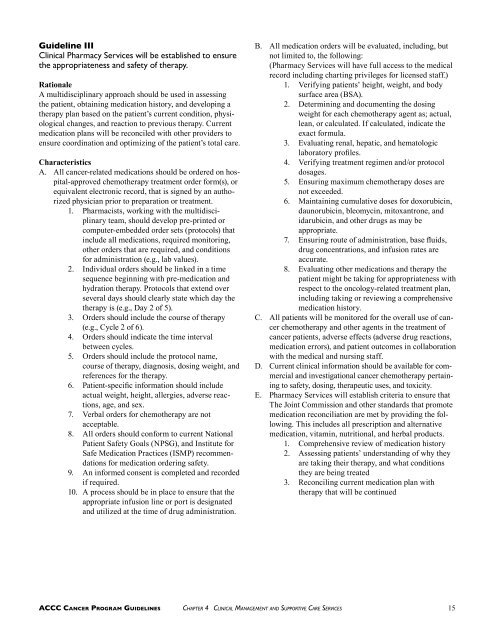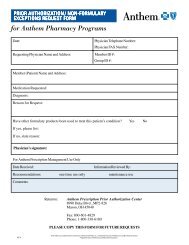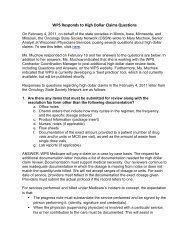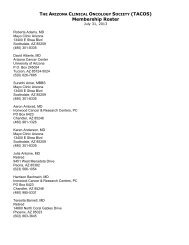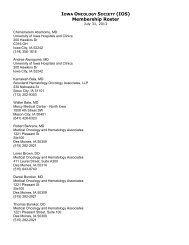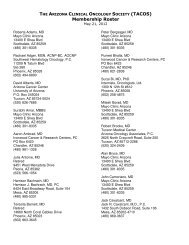Cancer Program Guidelines - Association of Community Cancer ...
Cancer Program Guidelines - Association of Community Cancer ...
Cancer Program Guidelines - Association of Community Cancer ...
Create successful ePaper yourself
Turn your PDF publications into a flip-book with our unique Google optimized e-Paper software.
Guideline III<br />
Clinical Pharmacy Services will be established to ensure<br />
the appropriateness and safety <strong>of</strong> therapy.<br />
Rationale<br />
A multidisciplinary approach should be used in assessing<br />
the patient, obtaining medication history, and developing a<br />
therapy plan based on the patient’s current condition, physiological<br />
changes, and reaction to previous therapy. Current<br />
medication plans will be reconciled with other providers to<br />
ensure coordination and optimizing <strong>of</strong> the patient’s total care.<br />
Characteristics<br />
A. All cancer-related medications should be ordered on hospital-approved<br />
chemotherapy treatment order form(s), or<br />
equivalent electronic record, that is signed by an authorized<br />
physician prior to preparation or treatment.<br />
1. Pharmacists, working with the multidisciplinary<br />
team, should develop pre-printed or<br />
computer-embedded order sets (protocols) that<br />
include all medications, required monitoring,<br />
other orders that are required, and conditions<br />
for administration (e.g., lab values).<br />
2. Individual orders should be linked in a time<br />
sequence beginning with pre-medication and<br />
hydration therapy. Protocols that extend over<br />
several days should clearly state which day the<br />
therapy is (e.g., Day 2 <strong>of</strong> 5).<br />
3. Orders should include the course <strong>of</strong> therapy<br />
(e.g., Cycle 2 <strong>of</strong> 6).<br />
4. Orders should indicate the time interval<br />
between cycles.<br />
5. Orders should include the protocol name,<br />
course <strong>of</strong> therapy, diagnosis, dosing weight, and<br />
references for the therapy.<br />
6. Patient-specific information should include<br />
actual weight, height, allergies, adverse reactions,<br />
age, and sex.<br />
7. Verbal orders for chemotherapy are not<br />
acceptable.<br />
8. All orders should conform to current National<br />
Patient Safety Goals (NPSG), and Institute for<br />
Safe Medication Practices (ISMP) recommendations<br />
for medication ordering safety.<br />
9. An informed consent is completed and recorded<br />
if required.<br />
10. A process should be in place to ensure that the<br />
appropriate infusion line or port is designated<br />
and utilized at the time <strong>of</strong> drug administration.<br />
B. All medication orders will be evaluated, including, but<br />
not limited to, the following:<br />
(Pharmacy Services will have full access to the medical<br />
record including charting privileges for licensed staff.)<br />
1. Verifying patients’ height, weight, and body<br />
surface area (BSA).<br />
2. Determining and documenting the dosing<br />
weight for each chemotherapy agent as; actual,<br />
lean, or calculated. If calculated, indicate the<br />
exact formula.<br />
3. Evaluating renal, hepatic, and hematologic<br />
laboratory pr<strong>of</strong>iles.<br />
4. Verifying treatment regimen and/or protocol<br />
dosages.<br />
5. Ensuring maximum chemotherapy doses are<br />
not exceeded.<br />
6. Maintaining cumulative doses for doxorubicin,<br />
daunorubicin, bleomycin, mitoxantrone, and<br />
idarubicin, and other drugs as may be<br />
appropriate.<br />
7. Ensuring route <strong>of</strong> administration, base fluids,<br />
drug concentrations, and infusion rates are<br />
accurate.<br />
8. Evaluating other medications and therapy the<br />
patient might be taking for appropriateness with<br />
respect to the oncology-related treatment plan,<br />
including taking or reviewing a comprehensive<br />
medication history.<br />
C. All patients will be monitored for the overall use <strong>of</strong> cancer<br />
chemotherapy and other agents in the treatment <strong>of</strong><br />
cancer patients, adverse effects (adverse drug reactions,<br />
medication errors), and patient outcomes in collaboration<br />
with the medical and nursing staff.<br />
D. Current clinical information should be available for commercial<br />
and investigational cancer chemotherapy pertaining<br />
to safety, dosing, therapeutic uses, and toxicity.<br />
E. Pharmacy Services will establish criteria to ensure that<br />
The Joint Commission and other standards that promote<br />
medication reconciliation are met by providing the following.<br />
This includes all prescription and alternative<br />
medication, vitamin, nutritional, and herbal products.<br />
1. Comprehensive review <strong>of</strong> medication history<br />
2. Assessing patients’ understanding <strong>of</strong> why they<br />
are taking their therapy, and what conditions<br />
they are being treated<br />
3. Reconciling current medication plan with<br />
therapy that will be continued<br />
ACCC <strong>Cancer</strong> <strong>Program</strong> <strong>Guidelines</strong> Chapter 4 Clinical Management and Supportive Care Services 15


